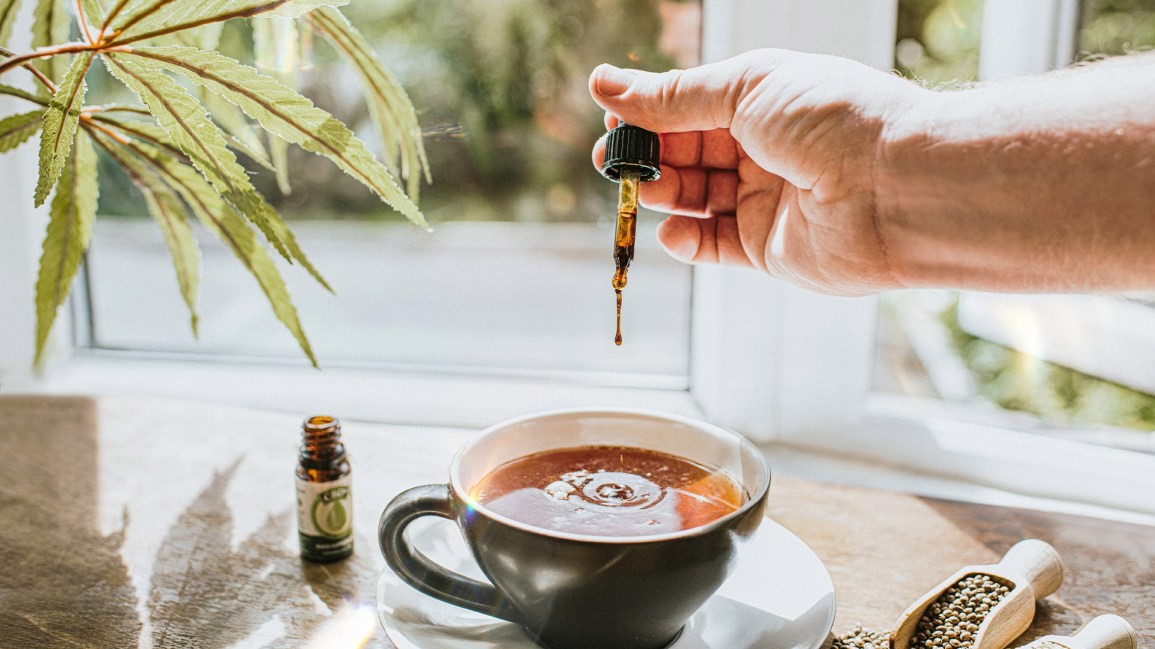First, if you didn’t know, hemp and marijuana are actually the same plant, Cannabis sativa, that has been bred differently, much the way cauliflower and Brussels sprouts are technically the same plant.
Hemp is the variety of the Cannabis sativa plant that contains high amounts of CBD, or cannabidiol (a nonpsychoactive component in the plant), in addition to other healthy compounds and very low amounts of THC (the psychoactive component in marijuana) and is legal, whereas marijuana is Cannabis sativa bred to have high amounts of THC and remains illegal in most states.
There are a lot of different types of cannabis-derived extracts, and a lot of confusion, so let’s start with some definitions.
Hemp seed oil
When it is derived from the seed of the plant for culinary purposes, it is referred to as hemp seed oil. While hemp seed oil is full of omega-3 fatty acids and is a great addition to a healthy diet, it does not contain any of the phytocannabinoids that have made hemp oil so popular.
Hemp oil extract
The hemp oil we are referring to here is the phytocannabinoid-rich extract derived from the seed and/or stalk of the cannabis plant. The dominant, and most famous, cannabinoid in hemp is, of course, cannabidiol (CBD). But CBD is just one beneficial phytocannabinoid compound, and you have so much more to gain from the whole hemp plant.*
For this article, we are focusing on the benefits of a hemp oil extract that contains a significant amount of CBD, among other cannabinoids, not culinary hemp seed oil.
6 benefits of hemp oil.
Hemp oil extract is rich in many health-promoting compounds, especially those that interact with our endocannabinoid system—a widespread regulatory system that affects digestive and immune functions, brain health, and more.*
So, what exactly can hemp oil extract do? The research is quite compelling.
1. It can help manage stress.*
The shaky, sweaty, nervous-stomach stressed state appears to be no match for phytocannabinoids.* A 2011 double-blind study found that 600 mg of the phytocannabinoid CBD administered to those with social anxiety disorder (SAD) 90 minutes before a public speaking test helped manage the physiological symptoms of stress.* Participants maintained normal blood pressure and heart rate and reported lower levels of discomfort, resulting in a similar presentation as those without SAD.* In fact, a neuroimaging study found that participants had increased activity in the brain region associated with mediating stress when they took 400 mg of CBD oil than when they did not.*
2. It can soothe aching joints.*
Inflammation is responsible for the pain, swelling, and discomfort in musculoskeletal disorders like arthritis and gout. Phytocannabinoids have properties that can help manage these symptoms.* In fact, a survey of arthritis patients conducted by the Arthritis Foundation found that 79% of respondents reported having used, were currently using, or were considering using hemp oil extract.*
While more research is needed, animal studies suggest these patients may be on to something. In one animal study, it was found that arthritic mice that were given phytocannabinoids had lower levels of proinflammatory cytokines than those who were not.* Other studies have found that hemp oil extract can help manage cartilage breakdown.*
3. It can support healthy immune function.*
The endocannabinoid system closely interacts with and supports healthy immune function.* In fact, immune cells have cannabinoid receptors and even secrete their own endocannabinoids and have a transport system for these chemicals. Endocannabinoids exert an immune-modulating effect, enhancing immune function when needed, as well as down-regulating immune function in cases of autoimmune conditions.*
Although endocannabinoids are the cannabinoids the body produces itself, plant cannabinoids (phytocannabinoids) like those found in hemp, can also interact with and bind to endocannabinoid receptors.* By supplementing the endocannabinoid system with phytocannabinoids, you can help further support the immune system.*
4. It can help you sleep.*
One in three American adults reports not getting enough sleep, according to the CDC. Lack of sleep, whether it is due to anxiety, diagnosed sleep disorders, or other disruptions, causes more than just groggy mornings; over time it can affect overall health.
Phytocannabinoids might help put some of those issues to bed. In a 2019 case series, 66% of the adults studied experienced better quality sleep after one month of CBD supplementation with dosages ranging from 25 to 75 mg per day.*
According to other research, phytocannabinoids do not negatively affect sleep cycles and can enhance REM sleep, the most restorative phase of sleep.*
5. It’s good for your skin.*
Hemp has antioxidant properties that help to nourish, revitalize, and support skin health.* Specifically in the case of acne vulgaris, with overproduction of oils in sebaceous glands, hemp oil and its phytocannabinoids have been found to activate the endocannabinoid system in the skin, calming flare-ups and managing normal production of oily sebum.*
6. It can support digestion.*
Enteric glial cells are cells in the intestines that release pro-inflammatory cytokines in the GI tract. These glial cells are vital for surviving an infection, but they can also stimulate chronic gut inflammation, triggering and perpetuating digestive issues.
Hemp oil extract has been shown to help manage mast cells (cells that hold histamine) and the adverse effects of endotoxins (toxins contained within certain bacteria).* Some studies show hemp oil can help manage the symptoms of various bowel conditions, such as diarrhea, nausea, and cramping.*
Phytocannabinoids and the entourage effect.
The CBD benefits you’ve no doubt heard about at this point have everything to do with CBD being a phytocannabinoid. Which, as renowned integrative physician Robert Rountree, M.D., puts it “Phyto just means ‘plant,’ and cannabinoids means ‘chemicals that affect the endocannabinoid system.'”
So, phytocannabinoids are substances found in the Cannabis sativa plant, as well as other plants like clove, that interact with the body’s endocannabinoid system.
Hemp oil extract labeled as full-spectrum or broad-spectrum incorporates the whole hemp plant, is high in CBD and other phytocannabinoids, encourages a synergistic effect, and enables the plant’s compounds to influence the body’s stress response, brain and immune function, gut health, fertility, and more.*
Here’s why: Products made from the whole plant rather than just an isolated ingredient such as CBD work together on your behalf, giving you more benefit.* Research has labeled this phenomenon the entourage effect. When you give your body access to all of hemp’s beneficial compounds, such as terpenes (aromatic essential oils), flavonoids, phytocannabinoids, fatty acids, and more, you magnify hemp’s heath-inducing effects.*
But is it legal?
The federal 2018 Farm Bill legalized hemp, as defined as the cannabis sativa plant with less than 0.3% THC, in all 50 states. So it’s no wonder you’ve been seeing CBD shops popping up around town.
Anything else I should know about hemp oil?
Hemp oil can be purchased in various forms, including oil, capsule, and topical products. Although there is no standard dosage, integrative neurologist Ilene Ruhoy, M.D., Ph.D., explains, when it comes to recommending a dose, it “really depends on what I am treating, and there is a wide range, but often up to 300 mg per day.”
Studies apply a range of doses, with most varying from 5 to 50 mg per kg of body weight per day or standard doses of 25 to 1,000 mg per day.
To make sure you are buying a quality product, look for full-spectrum or broad-spectrum hemp oil extract to get the whole plant benefits, and ask for a third-party certificate of analysis if not readily available to ensure there are no contaminants, such as heavy metals.
The safety profile of hemp oil extracts and CBD is well-known and outperforms many other drugs’ safety profiles. Hemp oil extract appears safe for nearly everyone over the age of 2, even at a wide range of doses. It is not yet known if hemp oil extract is safe for pregnant or breastfeeding women.
*If you are pregnant, breastfeeding, or taking medications, consult with your doctor before starting a supplement routine. It is always optimal to consult with a health care provider when considering what supplements are right for you.






Comments (0)